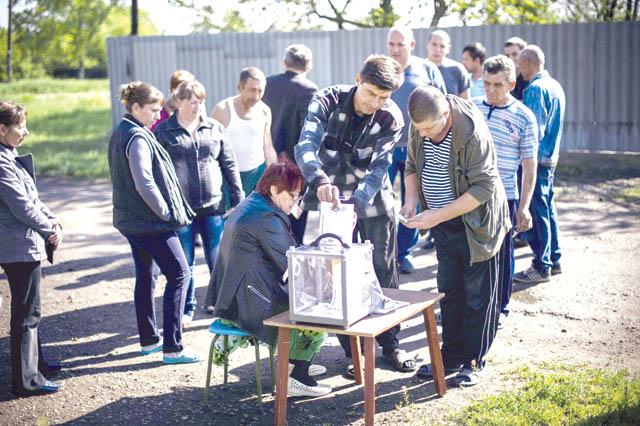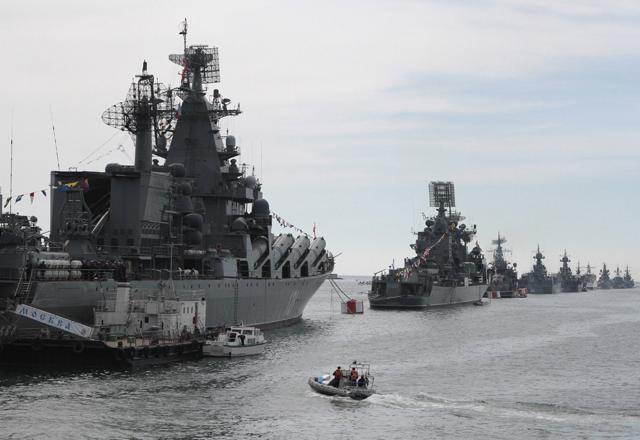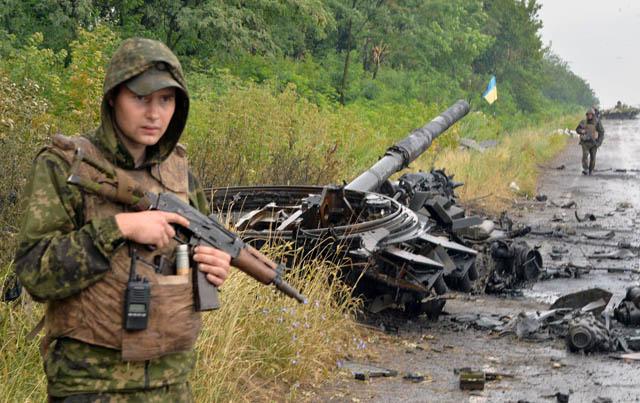You are here
Ukraine rebels appeal to join Russia after disputed votes
By AFP - May 12,2014 - Last updated at May 12,2014
DONETSK, Ukraine — Rebels in Ukraine’s eastern Donetsk region appealed on Monday to join Russia after what they claimed were resounding victories in independence referendums.
Moscow said it “respects” the result of the weekend votes on self-rule, which were denounced by authorities in Kiev as a “criminal farce” and by the West.
But Moscow left the door open to a negotiated solution, calling for talks between Kiev and the rebels in the industrial regions of Donetsk and Lugansk, home to seven million of Ukraine’s 46 million people.
The Kremlin’s move allayed fears Moscow might move to quickly annex the territories, as it did earlier this year after a similar vote in Ukraine’s Black Sea peninsula of Crimea.
But tensions remained high in the worst crisis in relations between Russia and the West since the end of the Cold War, and Germany announced plans for a diplomatic mission to Ukraine.
Foreign Minister Frank-Walter Steinmeier was to travel on Tuesday to Kiev and eastern Ukraine to support efforts to mediate a “national dialogue” between the interim pro-Western leadership in Kiev and pro-Moscow groups.
“Proceeding from the expression of the will of the people... and in order to restore historical justice, we ask the Russian Federation to consider the issue of the Donetsk People’s Republic becoming part of the Russian Federation,” the self-styled rebel governor of Donetsk, Denis Pushilin, told reporters.
Rebel officials in Donetsk had earlier said 89 per cent of voters backed breaking away from Ukraine in Sunday’s referendum, with a turnout of 75 per cent. Separatists in Lugansk said 94 per cent had backed independence.
Pushilin also said Ukraine’s May 25 presidential election, seen as vital to restoring order, “will not happen” in Donetsk.
Moscow endorsed the separatist votes on Monday, with President Vladimir Putin’s office saying in a statement: “Moscow respects the expression of the people’s will in Donetsk and Lugansk.”
The Kremlin called for “the results to be implemented in a civilised manner, without any repeat of violence, through dialogue between representatives of Kiev, Donetsk and Lugansk”.
Ukraine’s interim President Oleksandr Turchynov said Kiev was willing to “continue dialogue with those in the east of Ukraine who have no blood on their hands” but dismissed the votes.
“The farce that terrorist separatists call a referendum is nothing more than propaganda,” he said.
Both European and US officials denounced the referendums, with EU Council president Herman Van Rompuy calling them “illegal, illegitimate and not credible” on a visit to Kiev.
US State Department spokeswoman Jen Psaki said the voting “was an attempt to create further division and disorder” in Ukraine.
On the streets of Donetsk, meanwhile, confusion reigned.
“For me, I am still in Ukraine but who knows where we will be tomorrow — it is a mad house,” pensioner Anna told AFP in Donetsk.
“I was born in this country, my children were born here and my grandchildren, and I just want there to be peace.”
The crisis has raised fears of a violent breakup of Ukraine and the possibility of a civil war on Europe’s eastern edge.
An agreement between Moscow, Kiev, Washington and the EU in Geneva last month did little to ease tensions and Russian Foreign Minister Sergei Lavrov said Monday there was no point in further discussions without the separatists.
“Holding another four-way meeting makes little sense,” Lavrov said. “We do not want to repeat what has already taken place... but to move on to talks between Kiev and its opponents in the eastern regions of Ukraine.”
Kiev and Western leaders have accused Moscow of backing the rebels and on Monday EU foreign ministers announced new sanctions against Russians and Crimeans involved in the crisis.
A further 13 people and two companies were listed as subject to a European Union asset freeze and visa ban, EU diplomats said.
There were no immediate details available but sources said two Ukrainian firms in Crimea confiscated following the March annexation of the peninsula by Russia were on the list.
‘Far-reaching’ steps
Van Rompuy warned the EU was ready to take “additional, far-reaching” steps “in a broad range of areas” if Russia failed to help resolve the conflict.
The EU has so far imposed asset freezes and visa bans on 48 Russians and Ukrainians for violating or threatening Ukraine’s territorial integrity.
Highlighting the stakes for the EU, Russia’s state gas giant Gazprom warned on Monday it may halt shipments to Ukraine on June 3 in a repeat of previous energy wars that hit Europe.
Gazprom chief executive Alexei Miller said Ukraine must pay upfront for its June deliveries because of debts totalling $3.51 billion (2.55 billion euros).
Kiev had until the morning of June 3 to make the payment “or Ukraine will receive zero cubic metres [of gas] in June,” he added.
Nearly 15 per cent of all gas consumed in Europe is delivered from Russia via Ukraine and previous disputes in 2006 and 2009 disrupted supplies to parts of the EU.
On Monday, sporadic explosions and gunfire could be heard in the flashpoint town of Slavyansk, as Ukraine’s military pressed its siege of the rebel-held town.
Isolated violence flared during voting in some parts of eastern Ukraine on Sunday, where troops have been waging an offensive against well-armed rebels in control of several towns.
Anti-Kiev sentiment was riding high in the regions after a fierce firefight between troops and rebels that left several dead in the city of Mariupol on Friday.
Ukrainian officials have said 49 people have died in the Donetsk region since the start of the unrest, and deadly clashes and an inferno in Odessa killed at least 42 people earlier this month.
Related Articles
Pro-Russian rebels claimed a massive turnout in a vote they held Sunday to split east Ukraine into two independent republics, though Kiev slammed it as a “farce” amid Western fears it could lead to civil war.
Pro-Moscow rebels fighting in east Ukraine vowed Thursday to press on with disputed independence referendums, defying a call from President Vladimir Putin to postpone the vote in a bid to ease tensions.
Retreating pro-Russian insurgents dug in on Monday in Ukraine’s sprawling industrial hub of Donetsk after government forces scored a string of morale-boosting victories in the bloody battle for the future of the ex-Soviet state.



















